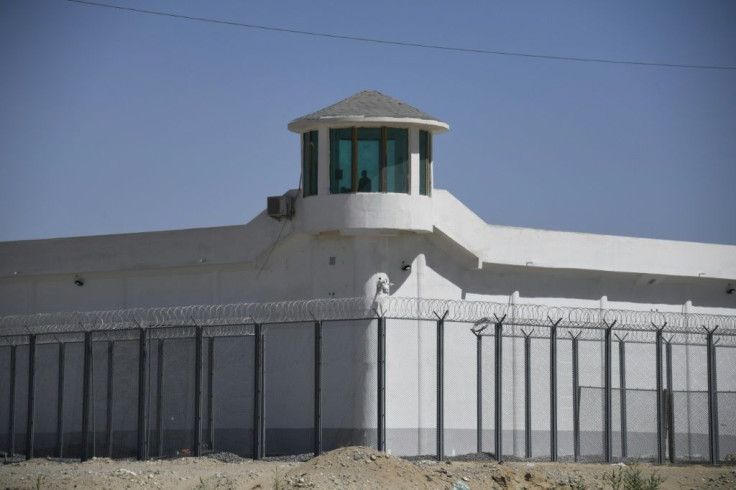CNN Report Details Inhuman Torture Of Innocent Uyghurs By Chinese 'Psychopaths'
KEY POINTS
- Officers had to fill a quota for the numbers of Uyghur's that had to be detained
- Used electrocution, waterboarding and sexual violence to force confession
- Searched detainees' houses, downloaded data from phone, personal computers
A former Chinese detective-turned-whistleblower gave witness accounts of the gross human rights violation and systemic torture of ethnic Uyghurs confined in internment camps in Xi Jinping's China.
In an interview with CNN, the former detective, identified only as Jiang, said armed officers carried out raids in the middle of the night on houses belonging to the Uyghur communities in the Xinjiang region in western China. The detainees were pulled out of the house, handcuffed and hooded. Officers threatened to shoot them if they showed any resistance.
"We took (them) all forcibly overnight. If there were hundreds of people in one county in this area, then you had to arrest these hundreds of people," Jiang told CNN.
Detainees including men, women and children as young as 14 were brutally beaten by the officers during the interrogation process, revealed Jiang. "Kick them, beat them (until they're) bruised and swollen. Until they kneel on the floor crying," he added.
The "suspects" were accused of terror crimes. However, Jiang believes none of the hundreds of prisoners he was involved in arresting had committed a crime. "They are ordinary people," he said.
The torture technique allegedly changed from officer to officer. "Everyone uses different methods. Some even use a wrecking bar, or iron chains with locks. Police would step on the suspect's face and tell him to confess," Jiang said.
The detainees were allegedly shackled to a metal or wooden chair, designed to immobilize the person or hanged from the ceiling, the whistleblower said, reiterating Human Rights Watch's findings. Other methods included sexual violence, waterboarding and electrocution. At times, Inmates were kept awake for days without water or food, Jiang said.
The torture only stopped once the witness confessed. Afterward, they were transferred to a prison or an internment camp.
Until now, China has denied all allegations of ethnic cleansing. "I want to reiterate that the so-called genocide in Xinjiang is nothing but a rumor backed by ulterior motives and an outright lie," said Zhao Lijian, Chinese Foreign Ministry spokesman, during a news conference in June.
The U.S. State Department estimates that up to 2 million Uyghurs and other ethnic minorities have been detained in Xinjiang since 2017, CNN reported.
In 2014, China promoted a mass detention campaign called “Strike Hard” to detain ethnic minorities, who were sent to prison for simple reasons such as wearing veils or growing beards.
Under the program, Jiang was deployed to Xinjiang at least four times. Jiang’s boss allegedly told him during his first visit that "separatist forces want to split the motherland. We must kill them all."
According to the detective, 150,000 police assistants were recruited from provinces around mainland China under a scheme called "Aid Xinjiang." Officers received double of their normal salary following the recruitment.
"I was surprised when I went for the first time," Jiang said. During the raids, officers were given a list of names of people they had to round up to meet their official targets on the number of Uyghurs they had to detain.
"It's all planned, and it has a system," Jiang said. "Everyone needs to hit a target."
Officers also searched the detainees’ houses and download data from their computers and phones. Sometimes, officers called a meeting in the town and detained people en masse.
In a single year, 900,000 Uyghurs and other ethnic minorities were detained in Xinjiang.
Jiang said he had to play “bad cop” at times but avoided participating in the most violent methods, whereas some of his colleagues enjoyed it. "Some people see this as a job, some are just psychopaths," Jiang added.
Guards would allegedly use rape as a torture measure. To dehumanize the detainees, guards would order other prisoners to rape and abuse new male inmates.
Abduweli Ayup, a 48-year-old Uyghur scholar from Xinjiang who was arrested in 2013, said he was gang-raped by dozens of Chinese inmates at the orders of prison guards, who also witnessed the assaults. He was later released after he was coerced into a fake confession of "illegal fundraising."
Omir Bekali, a former inmate, said he was detained in Xinjiang while on a business trip. He was tortured for four days in a police station basement. "They hung us up and beat us on the thigh, on the hips with wooden torches, with iron whips," said Bekali to CNN. The officers allegedly forced him to confess to supporting terrorism. Bekali spent 8 months in an internment camp.
Bekali’s father died in one of the camps. He added that his mother, sister and brother were also detained.
The Chinese government confirmed Bekali’s arrest on terrorism suspicion but denied having tortured him or detaining his family.
Jiang said he can never return to China. "I'd be arrested. There would be a lot of problems. Defection, treason, leaking government secrets, subversion. (I'd get) them all," he added.
Jiang expressed that he is guilty of his participation and hopes his former victims never have to go through a situation like this again.
"I'd hope for their forgiveness, but it'd be too difficult for people who suffered from torture like that," Jiang said.
"The United States has worked exhaustively to pull into the light what the Communist Party and General Secretary Xi Jinping wish to keep hidden through obfuscation, propaganda, and coercion," said former Secretary of State Mike Pompeo in January. "We will not remain silent. If the Chinese Communist Party is allowed to commit genocide and crimes against humanity against its own people, imagine what it will be emboldened to do to the free world, in the not-so-distant future. "

© Copyright IBTimes 2024. All rights reserved.




















